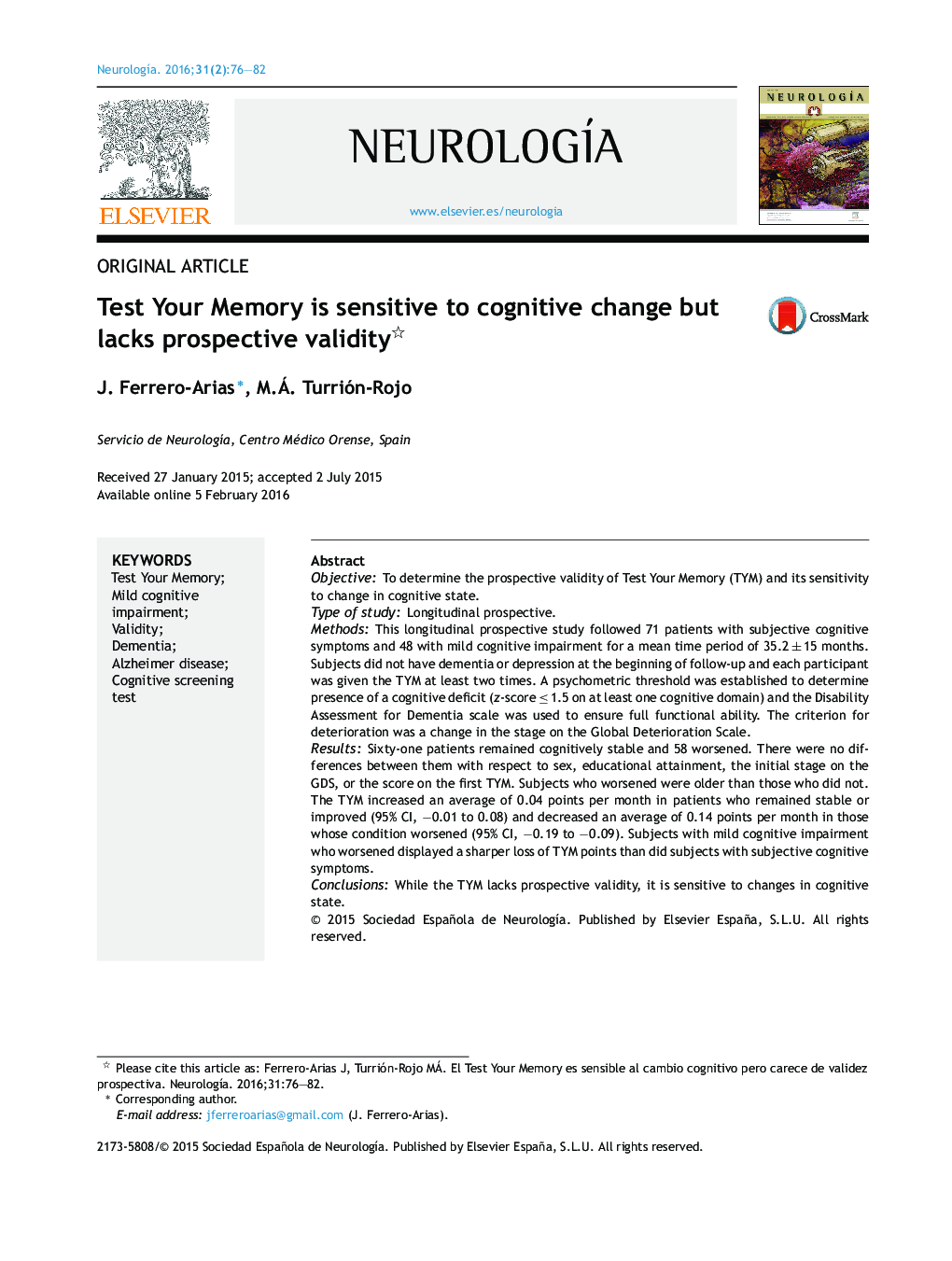| کد مقاله | کد نشریه | سال انتشار | مقاله انگلیسی | نسخه تمام متن |
|---|---|---|---|---|
| 3077094 | 1189120 | 2016 | 7 صفحه PDF | دانلود رایگان |
ObjectiveTo determine the prospective validity of Test Your Memory (TYM) and its sensitivity to change in cognitive state.Type of studyLongitudinal prospective.MethodsThis longitudinal prospective study followed 71 patients with subjective cognitive symptoms and 48 with mild cognitive impairment for a mean time period of 35.2 ± 15 months. Subjects did not have dementia or depression at the beginning of follow-up and each participant was given the TYM at least two times. A psychometric threshold was established to determine presence of a cognitive deficit (z-score ≤ 1.5 on at least one cognitive domain) and the Disability Assessment for Dementia scale was used to ensure full functional ability. The criterion for deterioration was a change in the stage on the Global Deterioration Scale.ResultsSixty-one patients remained cognitively stable and 58 worsened. There were no differences between them with respect to sex, educational attainment, the initial stage on the GDS, or the score on the first TYM. Subjects who worsened were older than those who did not. The TYM increased an average of 0.04 points per month in patients who remained stable or improved (95% CI, −0.01 to 0.08) and decreased an average of 0.14 points per month in those whose condition worsened (95% CI, −0.19 to −0.09). Subjects with mild cognitive impairment who worsened displayed a sharper loss of TYM points than did subjects with subjective cognitive symptoms.ConclusionsWhile the TYM lacks prospective validity, it is sensitive to changes in cognitive state.
ResumenObjetivoDeterminar la validez prospectiva del Test Your Memory (TYM) y su sensibilidad al cambio de estado cognitivo.Tipo de estudioLongitudinal prospectivo.MétodosSe siguió a 71 enfermos con síntomas cognitivos subjetivos y 48 con defecto cognitivo leve durante un periodo de tiempo medio de 35,2 ± 15 meses. Los sujetos no tenían demencia ni depresión al comienzo del seguimiento y a todos se le administró al menos dos veces el TYM. Se aplicó un criterio psicométrico para determinar la existencia de defecto cognitivo (≤ 1,5 puntos z en al menos un dominio cognitivo) y la escala Disability Assessment for Dementia para asegurar la indemnidad funcional. El criterio de empeoramiento fue el cambio de estadio en la Escala de Deterioro Global.ResultadosSesenta y un enfermos se mantuvieron cognitivamente estables y 58 empeoraron. No hubo diferencia entre ambos grupos con respecto al sexo, el nivel de instrucción, el estadio inicial de la GDS o la puntuación en el primer TYM. Los sujetos que empeoraron tenían más edad. El TYM aumentó un promedio de 0,04 puntos por mes en los pacientes estables o que mejoraron (IC95% −0,01 a 0,08) y disminuyó una media de 0,14 puntos por mes en los que empeoraron (IC95% −0,19 a −0,09). De los sujetos que empeoraron, en los que tenían defecto cognitivo leve la disminución de la puntuación del TYM fue más abrupta que en aquellos con síntomas cognitivos subjetivos.ConclusionesEL TYM carece de validez prospectiva pero es sensible al cambio de estado cognitivo.
Journal: Neurología (English Edition) - Volume 31, Issue 2, March 2016, Pages 76–82
